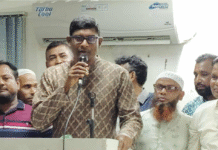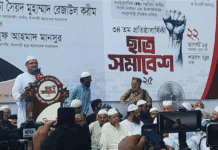Faruque Ahmed
Easy vulnerability of internet documents to hackers has become the biggest challenge to the government and public secrecy in all countries including Bangladesh. The Australian blooger Julian Assenge has become globally famous by stealing the US military secrets related to Iraq war and diplomatic cables of US missions abroad to cause a big jitter to the entire administration.
The latest revelations of CIA secrets by Snowden has also told the world that it is very difficult to keep in hold any top secret- be it at personal level or at the highest governmental level, due to vulnerability of high security documents to hacking .We often hear to our charm about cyber wars between groups of hackers and some
of it even turn out to be highly sensitive when groups between two countries attack each others sensitive secrecy to crate uncomfortable situation at highest political levels.
In Bangladesh we have also enough by now from hacking and breaking of government documents to crate sensation to the public in one hand and equal embarrassment to the government on the other. The hacking of the alleged Skype conversation and exchange of documents between a trial judge of ICT-1 and a Belgium based lawyer has in fact made public how hapless and insecure the government and its important agencies are in the face of hackers. The judge had to resign.
The downloading of the copies of Salahuddin Quader Chowdhury’s verdict on war crime trial from a webpage prior to the court’s handing over of the judgment has come as yet another embarrassment to the court as well as to the government. He has been given death sentence in the verdict, besides 70 years imprisonment for murder, rapes and such other crimes against humanity. This is the seventh verdict by the ICT and all but one has been handed over death.
Chowdhurry’s family has alleged in the ICT-1 court room immediately after the announcement of the verdict that the copy of the judgment was available in the website and they downloaded it in the earlier night. They showed the copy to the court and people who gathered to hear the judgment and alleged that the verdict was prepared at the law ministry and the judges have only added the punishment section and read out it in the open court. As source of the document, they cited a Belgium-based webpage and some other websites.
The attorney general immediately ruled out the claim saying ‘it is not true’ but the ICT register’s filing of a general diary with Shahbagh Police on the following day complaining theft of court documents proved the existence of such document in the internet even before the verdict was handed over in the open court. The register has demanded investigation and legal action against the perpetrators.
The hackers will be now identified and taken to justice for breaking government secrecy which is a crime as per the ICT ACT- 2013 to a maximum of 14 years imprisonment, besides a fine of up to Tk 1.0 crore. But questions have also been raised if breaking of the government document is a crime, what about preparing the court documents, specially the court judgment outside the court. Chowdhury’s family and his party BNP have raised questions whether the ICT judges were able to give a fair justice to the accused.
They said he has been denied of a fair trial and the availability of the verdict in the web pages has made the verdict controversial. The family will appeal against the verdict. In another development, former president of Bangladesh Bar Association Khondker Mahbub Hussain has been accused for contempt of court for criticising the verdict. We don’t know if he will face any legal charge for it.
New York Times reported on Oct 2 as follows: A war-crimes tribunal sentenced Salahuddin Quader Chowdhury to death for crimes dating back to Bangladesh war of independence in 1971 from Pakistan. He dismissed the verdict as politically driven.
The war-crimes tribunal on Tuesday sentenced Chowdhury, an opposition lawmaker, to death for rape, mass murder and torture during the independence war.
It was the seventh conviction handed down by the tribunal. Virtually every major turn in the legal process has sparked riots either by Islamist or secularist protesters, and the authorities on Tuesday had increased security in the Bangladesh capital Dhaka, and port city Chittangong, Chowdhury’s native region.
Chowdhury, 64, is aligned with the Bangladeshi Nationalist Party, which is expected to make gains in parliamentary elections in January. He was charged with killing 200 civilians and assisting the Pakistan Army in torture and mass murder.
The three-judge tribunal found him guilty of 9 of 23 charges, including trying to wipe out the Hindu population as a religious group by launching a systematic attack on a large scale with the aid of the Pakistan Army.
Chowdhury, then a student at Dhaka University, was not aligned with any political party during the war, but his father used the family residence, Goods Hill, as a prison and interrogation center at that time.
As the judges were leaving the bench, Chowdhury stood in the courtroom and dismissed the verdict as politically driven, saying a leaked copy had been available on the Internet for days. It came from the ministry, he said.
Chowdhury’s wife told reporters that the family would appeal the decision. We will do whatever we need to do to show that this is a farce, she said, according AP report.
The war crimes tribunal has shone a spotlight on unresolved tensions from the 1971 war, in which Bangladesh, a largely Muslim country, broke away from Pakistan at the cost of an estimated three million lives. Human Rights Watch criticized the tribunal, saying it is marred by strong judicial bias toward the prosecution.
Opposition forces have dismissed the tribunals as politically motivated. Jamaat-e-Islami, an Islamist opposition party allied with the Bangladeshi Nationalist Party has been barred by a Supreme Court ruling from participating in the January elections.
Source: Weekly Holiday










